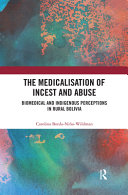

Most ebook files are in PDF format, so you can easily read them using various software such as Foxit Reader or directly on the Google Chrome browser.
Some ebook files are released by publishers in other formats such as .awz, .mobi, .epub, .fb2, etc. You may need to install specific software to read these formats on mobile/PC, such as Calibre.
Please read the tutorial at this link: https://ebookbell.com/faq
We offer FREE conversion to the popular formats you request; however, this may take some time. Therefore, right after payment, please email us, and we will try to provide the service as quickly as possible.
For some exceptional file formats or broken links (if any), please refrain from opening any disputes. Instead, email us first, and we will try to assist within a maximum of 6 hours.
EbookBell Team

4.3
8 reviewsCombining
biomedical, psychological, and anthropological approaches to
intergenerational incestuous violence experienced by rural indigenous
[and] peasant women in the Andean region, this book raises new questions
surrounding humanness and the normalisation of sexual violence. Through
original ethnographical research, the author analyses Andean
understandings of incest, medical positivist practices, as well as the
psychiatric ‘treatment’ of incestuous and gender-based violence.
The
book examines the implications that psychiatric institutionalisation
within the context of interethnic, gender, and class schemes, has on
what it means to be human. It also draws on a theoretical framework in
order to understand how discourses shape, and are simultaneously
problematized by individual experiences of sexual violence and incest.
Intergenerational incestuous violence against women is not necessarily
an exceptionalevent, but can be an ordinaryprocess,
one where through the articulation of biomedical and indigenous
medicine, as well as indigenous and mestizo forms of administration of
political power, womenas subjects can become possible.
This
book will appeal to scholars and students with an interest in
gender-based violence, as well as mental-health practitioners and
academics in Latin American studies, anthropology, gender studies, and
sociology.